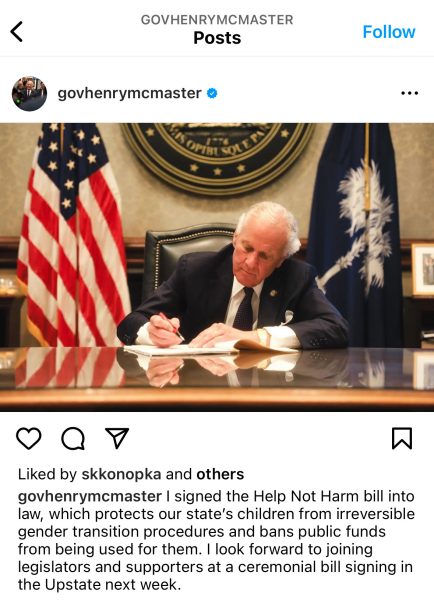
(Screen capture from @govhenrymcmaster on Instagram.)
While Minnesota is a refuge state for transgender people, half of states across the country have banned gender-affirming care for minors. According to the Human Rights Campaign, as of May 2024, 39% of transgender youth are living in states that have restricted gender-affirming care.
Sophomore William Hanna has stayed up to date with the bans on gender-affirming care. “I know a lot of families with trans kids are relocating out of state. It’s really just not tenable for a lot of kids, especially ones that have enjoyed this healthcare for so long,” they said. “It’s really jarring to suddenly just have it ripped out of your hands.”
South Carolina is the latest state to restrict gender-affirming care. On May 21, South Carolina Gov. Henry McMaster signed the ban into law, which restricts doctors from providing gender-affirming services, in the form of surgeries, puberty blockers, and hormone treatments, to minors in the state. This is similar to the constraints applied in other states, but the law also directs school administrators to inform parents if their child wants to change their name or pronouns. The ban takes effect immediately and transgender youth currently receiving gender-affirming care are required to halt treatment by January 2025.
Of the 25 states with restrictions on gender-affirming care for youth, the policies in 17 states have encountered legal challenges. While the South Carolina law has not yet faced a lawsuit, several states’ legal battles have made it all the way to the Supreme Court.
For example, the parents of two transgender girls sued the state of Idaho for its Vulnerable Child Protection Act, passed in April 2023, for violating their daughters’ 14th Amendment Rights. The parents also requested that the law be paused until the case was decided so the girls could continue receiving care. The district court granted the parents’ request for an injunction for the plaintiffs—the daughters of the parents who sued—and statewide, preventing the enforcement of the law until the case was decided. Idaho officials appealed to the U.S. 9th Circuit Court of Appeals and then the Supreme Court to narrow the injunction from a statewide application. Ultimately, on Apr. 15, the Supreme Court reversed the lower court’s decision, allowing the ban to take effect. The Supreme Court’s involvement did not address whether bans on gender-affirming care are constitutional but instead limited the district court’s injunction to only include the plaintiffs.
Despite the controversies surrounding gender-affirming care, the American Academy of Pediatrics (AAP) has maintained its support for the services. In its October 2018 policy statement “Ensuring Comprehensive Care and Support for Transgender and Gender-Diverse Children and Adolescents,” which was reaffirmed in August 2023, the AAP outlined its gender-affirmative care model, which includes social changes, reversible treatments, and irreversible surgeries. “[These bans are] a politically motivated, scientifically incorrect movement, and it’s hurting a lot of people,” Hanna said.
Transgender youth living in states with bans on gender-affirming care have been forced to outsource the services they once sought in-state. With South Carolina’s recent ban, Virginia is now the only state in the South that does not limit gender-affirming services for minors.
The Minnesota Legislature passed a law in 2023 protecting the rights of people who travel to Minnesota to access gender-affirming care. During the 2024 session, the legislature discussed a bill to require state health insurers to cover gender-affirming care. Rep. Leigh Finke (DFL-St. Paul) sponsored the Trans Refuge Bill that passed in 2023 and said, “Families who have fled are already here, and many more are planning to come. We’re going to be ready to take care of them, and to provide them with the health care they need.”